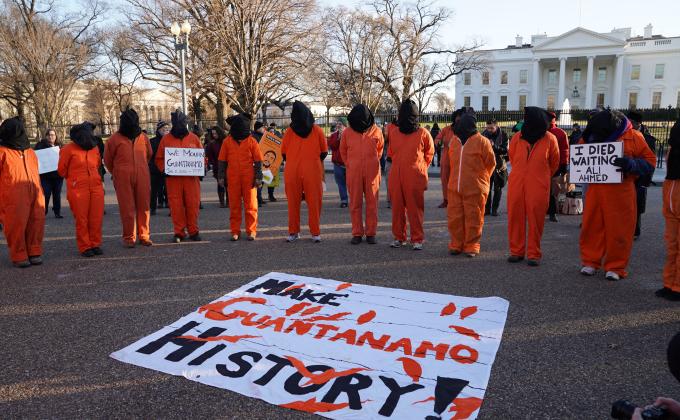On 17 February 2015, Shamima Begum (15), Kadiza Sultana (17), and Amira Abase (17), boarded a flight from London's Gatwick Airport to Istanbul. After an in Bayrampasa, Turkey, they got on a bus to Urfa – a town close to the Syrian border. It is thought that they crossed the Turkish-Syrian border and travelled towards ISIS-held territory with the help of human traffickers. Several weeks later Sir Bernard Hogan-Howe, then Metropolitan Police Commissioner, gave oral evidence in front of the United Kingdom’s Parliamentary Home Affairs Select Committee about the circumstances of the three teenagers’ disappearance. He expressly stated that they would not be treated as having committed a crime if they returned home – “if they return home there are no terrorism issues here”. This view was supported by the then Assistant Commissioner Mark Rowley QPM Metropolitan Police who expressly differentiated between “the person running around northern Iraq with a Kalashnikov” and three schoolgirls who had been lured into travelling to Syria. Throughout the Home Affairs Select Committee hearing, Shamima Begum, Kadiza Sultana and Amira Abase were referred to as young girls who fell victim to radicalisation and who made a “huge and terrible mistake”. During the hearing, a number of comments and criticisms were made as whether the police services had missed key opportunities to intervene at various stages to disrupt and/or prevent the travel.
Revocation of British Citizenship as Conducive to the Public Good
On 13 February 2019 Shamima Begum, the only known survivor of the three, requested to return home to Britain through an interview with The Times. By 19 February 2019, her British citizenship was revoked. The immediate impact of a revocation is quite significant – an individual loses the right to re-enter the United Kingdom (UK) and the right to rely on consular protections. This decision marks a significant departure from the recent comments made by Ben Wallace, the Minister of State for Security, who stated that “As a British citizen [Shamima Begum] has a right to come home here … We are obliged to make sure our citizens have rights, no matter who they are.” He made this statement on 14 February 2019. In addition, the proposed approach within the UK’s Strategy for Countering Terrorism (CONTEST) for returnees from Syria expressly refers to a managed return, potential use of a Temporary Exclusion Order, investigation into criminality and/or rehabilitation and reintegration into society. In 2018, Ben Wallace confirmed that an estimated 400 individuals had been allowed to return to the UK after engaging in fighting with groups such as ISIS. So why has Shamima Begum been prevented from returning where many others have not?
There have been suggestions that the decision is politically motivated. Concerns have been raised – aptly and persuasively – that this case sets a dangerous precedent as to what it means to be British and more specifically, that citizenship rights can depend on heritage. Shamima Begum’s case is not exceptional however. The year 2017 marked a significant increase in the use of revocation orders as 104 individuals were deprived of British citizenship. In comparison, in 2016, 14 people lost their citizenship. Figures for 2018 are not available yet. Same as in the Shamima Begum case, all of these orders were made pursuant to Section 40 (2) of the British Nationality Act 1981. Under this Section, the Home Secretary can deprive a person of citizenship status if he or she is satisfied that this deprivation is conducive to the public good. The order cannot however result in an individual becoming stateless. As such, Section 40 (4A) includes the proviso that the Home Secretary should have reasonable grounds for believing that the individual in question is able, under the law of a country or territory outside the United Kingdom, to become a national of such a country or territory. In Shamima Begum’s case, the order to deprive her of citizenship rests on the Home Secretary’s belief that Shamima Begum is entitled to Bangladeshi citizenship by descent through her mother. This view has already been challenged by the Bangladeshi Minister of Foreign Affairs who vehemently refuted the suggestion that Shamima Begum is the holder of dual citizenship – “she is not a Bangladeshi citizen and there is no question of her being allowed into Bangladesh”.
Thus, is Shamima Begum at present de facto if not de jure stateless? Applicable case law from the Special Immigration Appeals Commission suggests that she may be automatically eligible for Bangladeshi citizenship by descent as she is under the age of 21 and has Bangladeshi heritage. This eligibility has been contested. More pertinently perhaps, she has never visited Bangladesh, has been born, raised and radicalised in the UK and she considers the UK to be her home. Therefore, what are the steps she can take to appeal the order to revoke her British citizenship? Concomitantly, what is the likelihood of a successful appeal?
Bangladeshi Citizenship by Descent and the Special Immigration Appeals Commission
In the UK, decisions to revoke a citizenship can be challenged in the Special Immigration Appeals Commission (SIAC). SIAC is a specialised tribunal, which also has purview over appeals of deportation, detention or exclusion decisions due to national security considerations. What could be of significance in Shamima Begum’s case is the permitted use of secret (sensitive intelligence) evidence in a closed material procedure (CMP). Within a CMP, SIAC can consider secret or closed evidence without an appellant or their legal team being given the access to hear the evidence. Instead, the interests of an appellant during a CMP are represented by a Special Advocate who can subject the closed evidence to scrutiny. The Special Advocate is not allowed to discuss the closed evidence with an appellant and their legal team. It is quite likely that as part of putting forward his reasoning for revoking Shamima Begum’s citizenship, the Home Secretary will request a CMP in order to present evidence as to why her presence in the UK is not conducive to the public good. A CMP would allow the Home Secretary to put forward evidence obtained through cooperation with other intelligence services. As past precedent has demonstrated, the UK government tends to be highly reluctant to allow such evidence to form part of open court proceedings. In relation to the potential entitlement to Bangladeshi citizenship by descent, two recent SIAC cases illustrate the complexities and uncertainties associated with interpreting and applying the relevant legislation of another jurisdiction.
In G3 (Appellant) and Secretary of State for the Home Department (Respondent), decided in December 2017, G3 was a British national by birth. At the time of her birth, her father, a Bangladeshi national, was settled in the UK. In August 2017, the Home Secretary sought to deprive her of British nationality on the basis that she has been involved in terrorism-related activity with ISIS overseas, holds extremist views and therefore poses a risk to UK’s national security. She was deemed to be a dual British/Bangladeshi national. She appealed the revocation decision arguing that without a British citizenship she would be left stateless as she did not hold a Bangladeshi citizenship.
Under Section 5 of the Bangladeshi Citizenship Act 1951, a person born after 1951, would be a Bangladeshi citizen by descent if their mother or father was a Bangladeshi citizen at the time of birth. Section 14 (1) of the Act prohibits dual nationality. It was argued in the case that subsection (1A) adds a disclaimer that the prohibition does not apply to persons under the age of 21. In 2008, the Bangladeshi government issued an Instruction applicable only in respect of the UK. Under the Instruction, if a citizen of Bangladesh accepts citizenship of the UK and does not withdraw their loyalty to Bangladesh, their Bangladeshi citizenship remains in effect. According to UK case law, the question of whether an individual could obtain another citizenship depends on a) an interpretation of the nationality laws and relevant terminology of the other country and b) the other country’s state practice in applying these laws. In order to review the applicable nationality laws, SIAC relied on the expert testimony of three witnesses. After assessing all of the evidence and expert testimony, SIAC found that if G3 was deprived of her British citizenship, she would become stateless. Her appeal against the revocation order was allowed.
In November 2018, SIAC grappled with the same issues in E3 and N3 (Appellants) and the Secretary of State for the Home Department (Respondents). The Home Secretary sought to deprive both appellants of British citizenship on terrorism-related and national security grounds (using the powers under Section 40(2) again). The Home Secretary argued that E3 and N3 were British/Bangladeshi dual citizens and thus the revocation would not render them stateless. What distinguishes this case from the G3 case was the submission of a Note Verbale, which provided further context on the operation of the 2018 Instruction and evidence of Bangladeshi state practice in cases such as this. The argued effect of the Note Verbale was that if an individual was a) British at birth or through naturalisation, b) currently under the age 21, and c) has a parent who was a Bangladeshi citizen at their birth, they are entitled to Bangladeshi citizenship by descent. However, SIAC found that the Note Verbale did not offer sufficient evidence of state practice to support the Home Secretary’s argument that N3 and E3 are dual nationals. “It is surprising that, on a matter of this potentially far-reaching importance, the Note Verbale is all that there is”. Ultimately, SIAC reached the same conclusion as in the G3 case: the decision to deprive E3 and N3 of nationality would render them stateless. Their appeal against the revocation order was allowed.
What these two cases suggest is that the entitlement to a Bangladeshi citizenship by descent may not as straightforward as assumed by the Home Secretary in the Shamima Begum case. Sajid Javid has recently alluded to the difficulties himself. There is a further complication stemming from the comments by the Bangladeshi Minister for Foreign Affairs, which indicate support for SIAC’s findings that there is no established practice on cases such as E3, N3 and Begum’s. Thus, if or rather, when Shamima Begum appeals against the decision to revoke her citizenship, there is a likelihood that she might be successful. It should be kept in mind, however, that SIAC expressly stated in the G3 case that “the findings in this appeal are not necessarily determinative of any future appeal brought by a person in a similar position to G3.” This view was supported and reiterated in the E3 and N3 case. Other factors that could have an impact on the outcome of an appeal in Shamima Begum’s case are her age (19), further evidence of established practice in Bangladesh in similar circumstances, and any closed evidence the Home Secretary may put forward.
Overall, the legal complexities in this particular and other similar cases, raise the question of why this measure is considered appropriate and effective by states such as the UK. Is the symbolism of revocation of citizenship and the message that it sends (modern day banishment) what makes the measure effective in the eyes of the state? Or the inevitable delay of return an individual faces while the legal processes slowly grind their wheels? Or is it that this measure involves a simpler and quicker process than other counter-terrorism/counter-extremism responses? Under the Section 40(2) powers, all that is required is an order by the Home Secretary, in comparison to a more lengthy investigation process and the imposition of a Terrorism Prevention and Investigation Measure for example, or a managed return from Syria and subsequent reintegration within society. Perhaps, the question we should be asking is why do states require such a far-reaching power in the first place. Ultimately, the threshold of ‘conducive to the public good’ can be applicable to a much broader group of individuals than just the highly unsympathetic terrorist suspects.
For now, Shamima Begum is in limbo facing lengthy legal proceedings. The revocation of her British citizenship combined with the strong comments by the Bangladeshi Minister for Foreign Affairs suggests that she is de facto if not de jure stateless. The impact of this cannot be understated. Statelessness significantly endangers the rights of an individual. It renders them exceptionally vulnerable as it would be almost impossible to acquire travel and identification documents, to legally reside in a territory or access basic public services. As so compellingly put by Hannah Arendt losing a citizenship is equivalent to losing the right to have rights.








